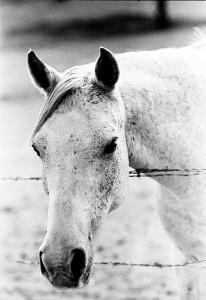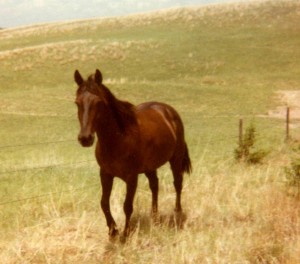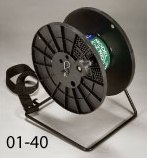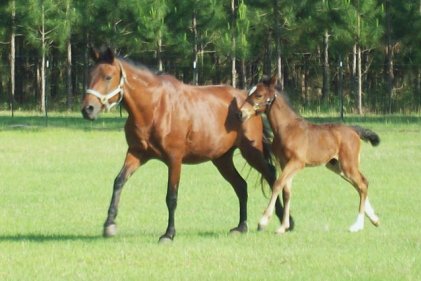 Fencing is always a problem when you’re dealing with horses. It seems like it doesn’t matter what kind of fence you have: wood, pipe, electric tape, electric wire, high tensile wire, mesh wire, or barbed wire—a horse can find a way to mess it up or get hurt on it. A responsible horse owner will provide the best they can for their horses and just pray that nothing bad happens, because a fence injury can often render a horse useless.
Fencing is always a problem when you’re dealing with horses. It seems like it doesn’t matter what kind of fence you have: wood, pipe, electric tape, electric wire, high tensile wire, mesh wire, or barbed wire—a horse can find a way to mess it up or get hurt on it. A responsible horse owner will provide the best they can for their horses and just pray that nothing bad happens, because a fence injury can often render a horse useless.
I grew up on a ranch in mid-western Nebraska, in the Sandhills. Everything out there was three-strand barbed wire stapled to cedar limb posts, and usually not stretched that tight, due to the harsh weather and low maintenance done on it. Our horses were just expected to steer clear of it, or else. It would have cost a fortune to fence those half-section pastures in anything else, so barbed wire was really the only sensible option. For the most part, our ranch geldings did just fine, with only a scrape now and then that healed up. But there were a few horses that did not fare so well.
 I remember Smokey, our seal brown gelding that was treasured by my dad as his top cowhorse, and who taught my sister Kellie to ride. Smokey was proud cut or late cut, and always had a studdy attitude around new horses. We had an alfalfa field that adjoined the ranch gelding’s pasture, separated by only a three strand barbed wire fence, and we had pastured the colts and two-year-old bunch on the alfalfa field over the winter for years. The danger of it never crossed our minds, until we bought a stud colt from the Pitzer Ranch and put him out with the colts to grow a little that first winter. He and Smokey fought each other across that barbed wire fence, and Smokey being the aggressor, got caught in the wire. I wasn’t there when they found him, but I helped my sister Kandra doctor his wounds for the next several weeks as he slowly deteriorated and quit eating from the pain. My dad had to put him down, and the sadness we all felt was as if a family member had died. Soon after that, Dad put up a double fence and planted trees all along that alfalfa field, to separate the two pastures.
I remember Smokey, our seal brown gelding that was treasured by my dad as his top cowhorse, and who taught my sister Kellie to ride. Smokey was proud cut or late cut, and always had a studdy attitude around new horses. We had an alfalfa field that adjoined the ranch gelding’s pasture, separated by only a three strand barbed wire fence, and we had pastured the colts and two-year-old bunch on the alfalfa field over the winter for years. The danger of it never crossed our minds, until we bought a stud colt from the Pitzer Ranch and put him out with the colts to grow a little that first winter. He and Smokey fought each other across that barbed wire fence, and Smokey being the aggressor, got caught in the wire. I wasn’t there when they found him, but I helped my sister Kandra doctor his wounds for the next several weeks as he slowly deteriorated and quit eating from the pain. My dad had to put him down, and the sadness we all felt was as if a family member had died. Soon after that, Dad put up a double fence and planted trees all along that alfalfa field, to separate the two pastures.
I worked as a stablehand for a woman who showed a lot in Western Pleasure and Trail. She had a cute roan filly that was about to start training, and went out to find her one morning with a huge gash in her shoulder from a piece of pipe corral fencing. After some stitches and careful treatment, the filly healed just fine. This woman had all the best in horse facilities and took every precaution to protect her horses, but there was still that possibility of injury.
I had my three horses in a barbed wire enclosure, which my husband and I checked often to make sure it was tight and as high off the ground as possible. It was frustrating, because they would lean on the fence, reach over it to graze, and then my mare Daisy got a cut on her front leg. It healed up, but it made me really scared that we could lose a horse to barbed wire if we didn’t do something about it. So we put electric fencing on the inside of the barbed wire, to keep the horses away from it. We had tried to use only electric wire for their fencing, but the horses ran through it and we weren’t sure if it would keep them in. But putting a single strand of yellow wire along the inside of their existing fence has really made a difference. We still have to check it regularly so it isn’t shorted out anywhere, but it’s given me a lot of peace of mind because it keeps them from touching the wire.
 Something really cool that my husband discovered and ordered online is a type of reel that helps you wind up and store electric fencing easily. One fall we had to take down electric fence and move it to a different spot where we wanted to pasture our cows, and the electric wire didn’t fit on the spool it came on. So it ended up half wound up on a piece of two by four, and the rest of it was a huge knotted mass. Cowboy Dad worked on untangling the mass every night after supper, and I think it took him a couple of weeks to finish it. He was putting it on another piece of two by four, which was really awkward and didn’t wrap very quickly. After that, he bought a couple of these reels for electric fence and our life has been easier ever since! They strap to you so you don’t even have to hold them, and the reel unwinds the fence as you walk along, leaving your hands free to attach the wire to posts as you come to them.
Something really cool that my husband discovered and ordered online is a type of reel that helps you wind up and store electric fencing easily. One fall we had to take down electric fence and move it to a different spot where we wanted to pasture our cows, and the electric wire didn’t fit on the spool it came on. So it ended up half wound up on a piece of two by four, and the rest of it was a huge knotted mass. Cowboy Dad worked on untangling the mass every night after supper, and I think it took him a couple of weeks to finish it. He was putting it on another piece of two by four, which was really awkward and didn’t wrap very quickly. After that, he bought a couple of these reels for electric fence and our life has been easier ever since! They strap to you so you don’t even have to hold them, and the reel unwinds the fence as you walk along, leaving your hands free to attach the wire to posts as you come to them.
Fencing will always be a work in progress around our farm. We have a lot of plans on how we could improve it, and we’d really like to build a few more solid-fenced corrals. But the funds are hard to come by and for now we’ll hope the electric fence will do its job.


{ 2 comments }
I’m so glad to hear that putting up a strand of electric is working for you. We’re doing the same thing on our property this weekend, and it’s good to hear that it’s working for someone else.
I have a draft cross that keeps trying to push through our current fencing, and has injured himself twice now. We didn’t realize how he was injuring himself until the second time, when he actually pulled down a section of the fence!
He’s in solitary confinement until we get that electric up this weekend – hope it works for us, too!
Yes, I really think you will be happy with the results. It’s the cheapest alternative to building a whole new fence, I think. We use a solar powered fencer, and even though their systems go bad after a couple of years, they are worth it in their dependability and adaptability to any location.
Thanks for your comment! I wish you and Duke the best (I read your blog to find out more about your horse’s situation and hope he heals up perfectly) and hope your weekend goes well.